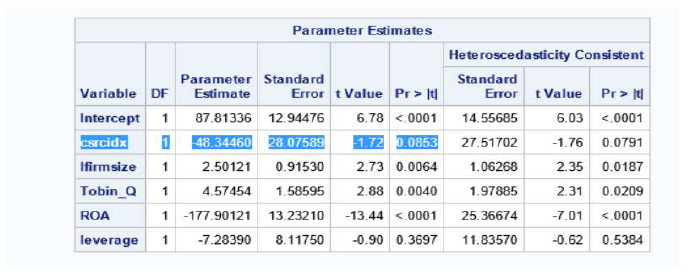Rebekah Inez Brau and Nile Hatch, Organizational Leadership and Strategy Department
Introduction
Corporate Social Responsibility (CSR), defined by the UN Industrial Development Organization as “initiatives by firms to integrate social and environmental concerns in their business operations and interactions with their stakeholders” is a controversial topic in the management literature. Although CSR is widely discussed, unfortunately some of the potential externalities of CSR have not been studied. The goal of this project is to determine if one of these externalities, a potential decrease in employee compensation, results from increased CSR.
Methodology
Although motivated through agency and contracting theories, our research is mostly empirical in nature. The data comes from two main databases. Employee wages and control variables are taken from Standard and Poor’s Compustat database. Overall wage figures and numbers of employees are used to compute an average wage per employee at the firm and year level. I condition these numbers on industry, as different industries have different wage rates.
The CSR data are taken from the Kinder, Lydenberg, and Domini’s (KLD) database. The KLD data includes 159 CSR variables such as Product Safety, Climate Change, Energy Efficiency, Diversity, Corporate Governance Strength, and so forth. I follow Hillman and Keim (2001) and Baron, Harjoto, and Jo (2011) to construct a CSR composite index that serves as a proxy for the degree of each firm’s CSR.
Results
The results of the Ordinary Least Squares (OLS) regression show that CSR (csrcidx) does significantly impact the employee compensation above a 91 percent level of significance (see table below). The total sample size was 4,400 firms, excluding financial firms. I followed the literature and excluded financial firms because their financial data are significantly different than operating firms and not comparable. As the table shows, csrcidx (highlighted in blue), or the level of CSR activity of a firm, has a negative impact on employee compensation.
Discussion
Although CSR is a broadly discussed topic within the literature, the potential externalities have not been thoroughly studied. This project reveals that there is a need for additional study of these potential externalities. Consistent with the argument of Milton Friedman, I have documented a significant and negative impact of CSR on employee compensation, for what I believe is the first time.
Future research can extend my project by analyzing why CSR affects employee compensation and establishing causation rather than just correlation as I have done. Researchers could interview employees of the firms surveyed in this study to see their views on CSR. There could be explanations in some of the companies where employees are on-board and very supportive of the CSR and do not mind that their compensation is affected. On the other hand, CSR could be an unfair “tax” as argued by Friedman.
Conclusion
In conclusion, this project has analyzed a specific externality of CSR. The OLS regression using data from Compustat and KLD databases illustrates that employee compensation is negatively and significantly correlated with CSR beyond the nine percent level. In other words, firms that practice CSR more aggressively also have a lower average employee wage compared to firms that did not practice CSR in the same industry and of similar size. This project adds to the field of CSR study by detecting a potential negative externality of CSR. I propose that researchers in the field of CSR acknowledge the correlation of CSR on employee wages and continue to research not only employee wage relationships but also other potential externalities of CSR.
Thank you for this opportunity to perform this research. I have learned more than I could have imagined by conducting this research and I am grateful for the ORCA grant.

